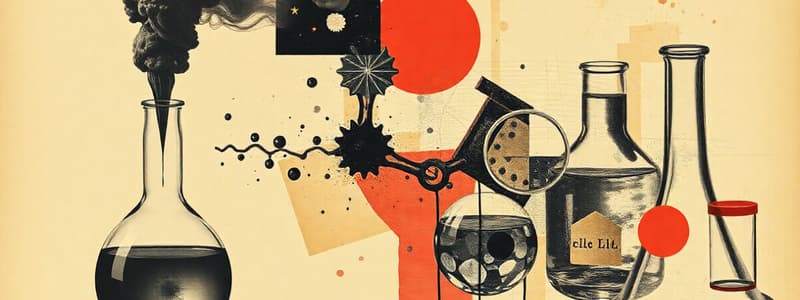Podcast
Questions and Answers
What is the general reaction equation when a metal reacts with water?
What is the general reaction equation when a metal reacts with water?
- metal + water → metal oxide + oxygen
- metal + water → metal carbonate + hydrogen
- metal + water → metal hydroxide + hydrogen (correct)
- metal + water → metal sulfate + hydrogen
Which of the following metals will react with steam but not with cold water?
Which of the following metals will react with steam but not with cold water?
- Gold
- Calcium
- Magnesium (correct)
- Potassium
Which metals listed below would not react with dilute acids?
Which metals listed below would not react with dilute acids?
- Gold (correct)
- Zinc
- Iron
- Magnesium
Which metal is more reactive than iron but less reactive than magnesium?
Which metal is more reactive than iron but less reactive than magnesium?
What is formed when metals react with oxygen?
What is formed when metals react with oxygen?
Which of the following represents a reaction with dilute hydrochloric acid?
Which of the following represents a reaction with dilute hydrochloric acid?
Which reaction does not occur between the metals and the compounds listed?
Which reaction does not occur between the metals and the compounds listed?
What prevents aluminium from reacting readily with water and dilute acids?
What prevents aluminium from reacting readily with water and dilute acids?
What characteristic of a metal indicates it is higher in the reactivity series?
What characteristic of a metal indicates it is higher in the reactivity series?
Which of the following equations correctly describes a reaction of calcium with cold water?
Which of the following equations correctly describes a reaction of calcium with cold water?
What is the order of reactivity of the following metals from most to least reactive?
What is the order of reactivity of the following metals from most to least reactive?
What is the primary method for determining the reactivity of less reactive metals when they react with water?
What is the primary method for determining the reactivity of less reactive metals when they react with water?
Which metal is least likely to react with acids based on its position in the reactivity series?
Which metal is least likely to react with acids based on its position in the reactivity series?
Which of the following statements about iron is true based on the reactivity series?
Which of the following statements about iron is true based on the reactivity series?
How does a greater temperature change in a reaction relate to metal reactivity?
How does a greater temperature change in a reaction relate to metal reactivity?
What occurs during a displacement reaction involving metals?
What occurs during a displacement reaction involving metals?
Which statement best describes the electron movement in a reaction between magnesium and copper sulfate?
Which statement best describes the electron movement in a reaction between magnesium and copper sulfate?
In the reaction Mg + CuSO4 → MgSO4 + Cu, what color change indicates that magnesium has displaced copper?
In the reaction Mg + CuSO4 → MgSO4 + Cu, what color change indicates that magnesium has displaced copper?
Why is magnesium considered a better reducing agent than copper?
Why is magnesium considered a better reducing agent than copper?
Which of the following is a correct product of the reaction between magnesium and iron(II) sulfate?
Which of the following is a correct product of the reaction between magnesium and iron(II) sulfate?
What property of metals allows them to displace others in a reactivity series?
What property of metals allows them to displace others in a reactivity series?
Which metal reacts violently with both cold water and acids?
Which metal reacts violently with both cold water and acids?
What is the reaction of zinc with steam?
What is the reaction of zinc with steam?
Which of the following metals does not react with steam or water?
Which of the following metals does not react with steam or water?
Which non-metal is included in the reactivity series to help extract metals from their oxides?
Which non-metal is included in the reactivity series to help extract metals from their oxides?
How do magnesium and aluminium differ in their reaction with steam?
How do magnesium and aluminium differ in their reaction with steam?
What is the reactivity trend of metals when reacting with oxygen?
What is the reactivity trend of metals when reacting with oxygen?
Among the following metals, which reacts moderately with cold water?
Among the following metals, which reacts moderately with cold water?
Which of the following statements is true regarding hydrogen in the reactivity series?
Which of the following statements is true regarding hydrogen in the reactivity series?
Flashcards are hidden until you start studying
Study Notes
Reactivity Series of Metals
- Metals can be arranged in order of reactivity based on reactions with water, acids, and oxygen.
- More reactive metals react more vigorously, forming metal hydroxides or oxides and hydrogen gas.
- Non-metals, like hydrogen and carbon, are also included in the reactivity series as they are used to extract metals.
Reactions of Metals with Water
- Most reactive metals (Potassium, Sodium, and Calcium) react with cold water, forming metal hydroxides and hydrogen gas.
- Less reactive metals (Magnesium and Aluminium) react with steam, forming metal oxides and hydrogen gas.
- The least reactive metals (Copper, Silver, and Gold) do not react with cold water or steam.
Reactions of Metals with Acids
- Metals above hydrogen in the reactivity series react with dilute acids, forming a salt and hydrogen gas.
- Less reactive metals (Gold, Silver, and Copper) do not react with acids.
- The more reactive the metal, the faster the reaction with the acid.
Reaction with Oxygen
- Reactive metals (Alkali metals) react easily with oxygen, forming metal oxides.
- Less reactive metals (Silver, Copper, and Iron) react with oxygen but much more slowly.
- Gold does not react with oxygen.
Deducing Order of Reactivity
- Order of reactivity can be deduced by observing reactions with water, acids, and oxygen.
- More vigorous reactions indicate higher reactivity.
- Temperature changes in reactions can also indicate reactivity: larger temperature changes mean higher reactivity.
Displacement Reactions
- A more reactive metal can displace a less reactive metal from a solution of its salt.
- More reactive metals are better reducing agents and lose electrons more easily.
- Less reactive metals are better electron acceptors and are reduced.
- Magnesium displaces copper from copper sulfate solution, forming magnesium sulfate and copper metal.
Reactivity of Aluminium
- Aluminium is highly reactive but appears less reactive due to a protective layer of aluminium oxide.
- This layer prevents reaction with water and dilute acids.
How to Determine the Reactivity of a Metal
- To determine the reactivity of a metal, observe the reactions with water, acids, and oxygen.
- The more vigorous the reaction, the higher the metal's position in the reactivity series.
Studying That Suits You
Use AI to generate personalized quizzes and flashcards to suit your learning preferences.




